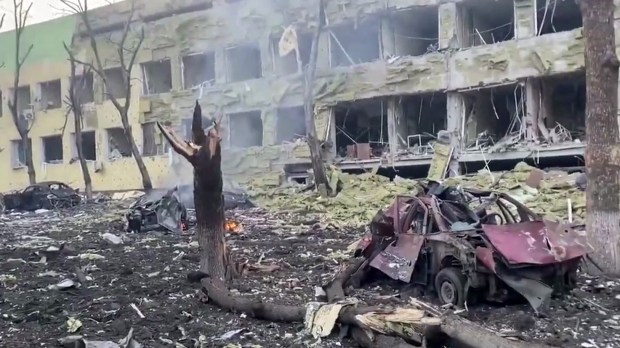Monday 2 May 2022
1. The end of the era of the pilgrim Pope?
2. Operation Mariupol: how the Pope tried to impose humanitarian corridors on Putin
3. After the reform of the Curia, all powers emanate from the Pope
4. Latin American bishops warn of the effects of the “fourth industrial revolution”
5. 450 years ago Pius V, the inquisitor Pope, died~
The end of the era of the pilgrim Pope?
The prospect that Pope Francis may soon undergo knee surgery could put an end to the “era of the pilgrim Pope,” according to Marco Grieco, journalist at the Italian daily Domani. He notes that apart from the trip to Malta, the Pontiff has not left Rome this year, and that, apart from an African trip to the DRC and South Sudan, many projects seem to be on hold for now. However the journalist wonders if the uncertainty about several trips, notably to Lebanon, could be a sign of “mistrust of the Holy See’s geopolitical weight in the international community.” The prospects of a meeting with Kirill in the Middle East or a trip to Kazakhstan – problematic because of the context with Russia and China – would tend to confirm this idea. No news about the trip to Canada has emerged either, notes the journalist, who concludes by saying that it is known that “the silences of the Pope speak louder than his words.”
Domani, Italian
On March 22, Ukraine’s President Zelensky said he had received a “promising” call from Pope Francis. According to the Italian weekly L’Espresso, the Pope asked his nuncio the following day to send a convoy of 50 buses to Mariupol to open a humanitarian corridor to get 2,500 civilians out. The Vatican then contacted the Patriarchate of Moscow to obtain the Kremlin’s authorization. Kirill agreed, provided that the mission was led by his patriarchate and the Vatican, and the date of March 27 was chosen. However, the Russian authorities ignored the project and “forbade the Catholic and Orthodox convoy to enter Mariupol.” When asked about the non-success of the operation, the nuncio in Ukraine, Bishop Kulbokas, spoke of a “failure, a pain,” saying that it was a decision that was “complicated to accept.” According to the Italian journalist, this setback has been fatal to the project of a meeting between the Patriarch and the Pope in Jerusalem. Allegedly, a second attempt to help Mariupol, more recent and still unsuccessful, was led by Cardinal Krajewski at the request of the Pope.
L’Espresso, Italian
After the reform of the Curia, all powers emanate from the Pope
Praedicate Evangelium, the new Apostolic Constitution, allows lay people, men and women, to head the dicasteries of the Curia, whose leadership is no longer tied to ordination. German journalist Benjamin Leven notes that this opening is not a surprise, but that its margin of application leaves “many observers” doubtful, especially concerning certain dicasteries. He recalls that paradoxically, this link had allowed, in the Second Vatican Council, to decentralize the power of the Church which had been built on the person of the Pope in the First Vatican Council. Benjamin Leven, quoting the canonist Gianfranco Ghirlanda, notes that from now on the power to exercise a function in the Curia results “from the authority of the Pope and is conferred by him,” and sees a return of the pendulum. The German journalist also notes an interesting detail: in the draft of 2019, it was planned that the Camerlengo would systematically be the coordinator of the Council for the Economy, currently Cardinal Marx. This is no longer the case.
Herder Korrespondenz, German
Latin American bishops warn of the effects of the “fourth industrial revolution”
On the occasion of May 1, International Workers’ Day, the Latin American Episcopal Council (CELAM) expressed its concern at the fourth industrial revolution. Its members call for the “humanization of companies” in order to counteract “robotization and automation of processes” that could lead to significant job losses, when 29 million people are already unemployed on the subcontinent. The Bishops are particularly concerned about “women and migrants, many of whom are forced into slave labor and sexual exploitation.” “Every time a person does not find work, part of God’s plan remains unfinished,” they said, recalling that Jesus himself was a worker and that “human hands are the hands of God.”
Vida Nueva Digital, Spanish
450 years ago Pius V, the inquisitor Pope, died
On May 1, 1572, the Dominican Pope Pius V died at the age of 68, in his mendicant monk’s habit. “His six-year term of office marked the height of the Church’s militant counter-reformation,” reports the German portal Katholisch. In charge of implementing the Council of Trent, he was able to draw on his background as an inquisitor. Born in Piedmont, he joined the Dominican order and had to face the Calvinist pressure coming from Geneva. Just as he was about to die, he was elected Pope. “Pius V made the papacy the agent of Catholic reform,” the article explains, by unifying the spiritual life of the Catholic world through a common catechism, a single breviary and a single missal. Wanting to set an example in matters of morality, he did not hesitate to be harsh though, and thus banished the Jews to the area of the “ghetto” in Rome, put to death a dozen heretics, excommunicated the Queen of England Elizabeth I, and defeated the Ottoman Empire at Lepanto.
Katholisch, German

